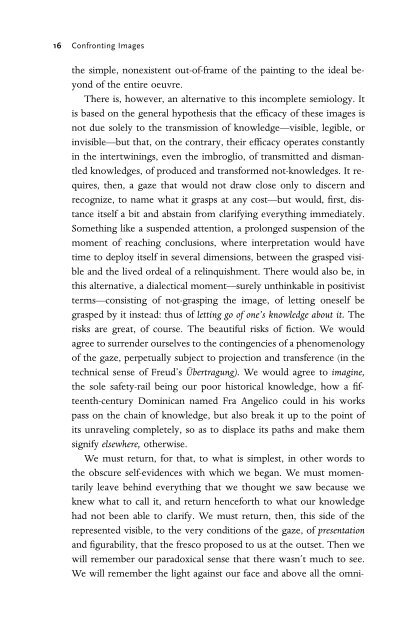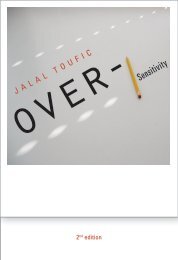- Page 3 and 4: CONFRONTINGQUESTIONING THE ENDS OF
- Page 5 and 6: LIBRARY OF CONGRESSCATALOGING-IN-PU
- Page 8 and 9: CONTENTSList of Illustrations xiTra
- Page 10: works, plays, inverts, and dissembl
- Page 13 and 14: xiiList of Illustrations14. Jan Ver
- Page 16 and 17: PREFACE TO THE ENGLISH EDITION:THE
- Page 18 and 19: The Exorcistxviipositive or ‘‘o
- Page 20 and 21: The Exorcistxixwhich takes up the e
- Page 22 and 23: The ExorcistxxiWarburg was a man wh
- Page 24 and 25: The Exorcistxxiiihand, the aestheti
- Page 26 and 27: The Exorcistxxvpresenting ideas in
- Page 28 and 29: Question PosedOften, when we pose o
- Page 30 and 31: Question Posed 3Books on the histor
- Page 32 and 33: Question Posed 5rency? Panofsky tur
- Page 34 and 35: Question Posed 7It should be clear
- Page 36: Question Posed 9eration of the book
- Page 39 and 40: Image not availableFra Angelico, Th
- Page 41: 14 Confronting Imagesas the most po
- Page 45 and 46: 18 Confronting Imagesand paradoxica
- Page 47 and 48: 20 Confronting Imageslost usage of
- Page 49 and 50: 22 Confronting ImagesThe men of the
- Page 51 and 52: 24 Confronting Imagester, which pos
- Page 53 and 54: 26 Confronting Imagesdelivered. The
- Page 55 and 56: 28 Confronting Imageseven of the vi
- Page 57 and 58: 30 Confronting Imagesintegrate them
- Page 59 and 60: 32 Confronting Images‘‘masters
- Page 61 and 62: 34 Confronting Imagestwo texts reve
- Page 63 and 64: 36 Confronting Imagesporary categor
- Page 65 and 66: 38 Confronting Images‘‘plants
- Page 67 and 68: 40 Confronting ImagesGoya, Manet, a
- Page 69 and 70: 42 Confronting Imagesically from th
- Page 71 and 72: 44 Confronting Imagesauto-teleology
- Page 73 and 74: 46 Confronting Imagesway perfect [e
- Page 75 and 76: 48 Confronting Imagesbeing-there [d
- Page 77 and 78: 50 Confronting Imagesart historians
- Page 79 and 80: 52 Confronting Imageshe remains on
- Page 81 and 82: 54 Confronting Imagesafter its dawn
- Page 83 and 84: 56 Confronting Imagesing its reader
- Page 85 and 86: 58 Confronting Images‘‘Most hum
- Page 87 and 88: 60 Confronting Imagescounting le op
- Page 89 and 90: 62 Confronting Imagesagain into the
- Page 91 and 92: Image not availableFIG 3. Giorgio V
- Page 93 and 94:
66 Confronting Imagesthat our ambig
- Page 95 and 96:
68 Confronting Images‘‘prevent
- Page 97 and 98:
70 Confronting Imagesimagines here
- Page 99 and 100:
72 Confronting Imagesknowledge, a c
- Page 101 and 102:
74 Confronting Imagesprincipalmente
- Page 103 and 104:
76 Confronting ImagesIdea, f. Perfe
- Page 105 and 106:
78 Confronting Imagesarti del diseg
- Page 107 and 108:
80 Confronting Imagesing compromise
- Page 109 and 110:
82 Confronting Imageswake of the Li
- Page 111 and 112:
84 Confronting Imagesof all cogniti
- Page 113 and 114:
86 Confronting Imagesby a new angel
- Page 115 and 116:
88 Confronting Imagesplicit content
- Page 117 and 118:
90 Confronting ImagesWinckelmann’
- Page 119 and 120:
92 Confronting Imagesin a single sm
- Page 121 and 122:
94 Confronting ImagesKantian tone,
- Page 123 and 124:
96 Confronting Imagesated, the most
- Page 125 and 126:
98 Confronting Imagesoverstepped th
- Page 127 and 128:
100 Confronting Imagessentational e
- Page 129 and 130:
102 Confronting Imagesabove the exp
- Page 131 and 132:
104 Confronting Imagesorigin, certa
- Page 133 and 134:
106 Confronting Imagesthroughout hi
- Page 135 and 136:
108 Confronting Imagestions, these
- Page 137 and 138:
110 Confronting Imagesulty of repre
- Page 139 and 140:
112 Confronting Imagescome, in the
- Page 141 and 142:
114 Confronting Imagesrial’’ of
- Page 143 and 144:
116 Confronting Imagessatanocracy a
- Page 145 and 146:
118 Confronting Imagesately closing
- Page 147 and 148:
120 Confronting Imagesance that it
- Page 149 and 150:
122 Confronting ImagesSo it is inde
- Page 151 and 152:
124 Confronting ImagesSo a second g
- Page 153 and 154:
126 Confronting Imagessay, correspo
- Page 155 and 156:
128 Confronting ImagesThe Philosoph
- Page 157 and 158:
130 Confronting ImagesThat the symb
- Page 159 and 160:
132 Confronting Imagesdefinition of
- Page 161 and 162:
134 Confronting Imagesdown to nothi
- Page 163 and 164:
136 Confronting Imagesimages by mak
- Page 165 and 166:
138 Confronting Imagesrational disc
- Page 167 and 168:
140 Confronting Imagesmented—a to
- Page 169 and 170:
142 Confronting Imagesour private b
- Page 171 and 172:
144 Confronting Imagesof replacing
- Page 173 and 174:
146 Confronting Imagesvisual model
- Page 175 and 176:
148 Confronting Imagesrelations wil
- Page 177 and 178:
150 Confronting Imagesis in questio
- Page 179 and 180:
152 Confronting Imagesment (Verschi
- Page 181 and 182:
154 Confronting Imagesthe rend open
- Page 183 and 184:
156 Confronting Imagesand amenable
- Page 185 and 186:
158 Confronting Imagessis or as tot
- Page 187 and 188:
160 Confronting Imagesthem. 47 When
- Page 189 and 190:
162 Confronting Imagesthemselves fr
- Page 191 and 192:
164 Confronting Imagesphenomena und
- Page 193 and 194:
166 Confronting Imagesclosure [unge
- Page 195 and 196:
168 Confronting Imageslifting his h
- Page 197 and 198:
170 Confronting Imagesin their beli
- Page 199 and 200:
172 Confronting Imagesof its own sy
- Page 201 and 202:
174 Confronting Imagessingularly co
- Page 203 and 204:
Image not availableAlbrecht Dürer,
- Page 205 and 206:
178 Confronting Imagesthe ‘‘asc
- Page 207 and 208:
180 Confronting Imagesits part, con
- Page 209 and 210:
182 Confronting Imagesasked himself
- Page 211 and 212:
184 Confronting Imagesto-be reposed
- Page 213 and 214:
186 Confronting Imagession, but the
- Page 215 and 216:
188 Confronting Imageshand were ima
- Page 217 and 218:
190 Confronting Imageschiasma and o
- Page 219 and 220:
192 Confronting Imagessessed by it
- Page 221 and 222:
194 Confronting Imagesthe individua
- Page 223 and 224:
196 Confronting ImagesImage not ava
- Page 225 and 226:
198 Confronting Imagesunderscores i
- Page 227 and 228:
200 Confronting Imageseverything, h
- Page 229 and 230:
Image not availableFIG 9. Fra Angel
- Page 231 and 232:
Image not availableFIG 10 Anonymous
- Page 233 and 234:
Image not availableFIG 11 Anonymous
- Page 235 and 236:
208 Confronting Imagesrepresentatio
- Page 237 and 238:
210 Confronting Imageseverything, I
- Page 239 and 240:
212 Confronting Imagesoffensive. 14
- Page 241 and 242:
214 Confronting Imagesself ). 152 .
- Page 243 and 244:
216 Confronting ImagesSo painting e
- Page 245 and 246:
218 Confronting Imagesbelieve it—
- Page 247 and 248:
220 Confronting Imagesitself precis
- Page 249 and 250:
222 Confronting Imagesaffirm life.
- Page 251 and 252:
224 Confronting Imagesthe ‘‘gre
- Page 253 and 254:
226 Confronting ImagesImage not ava
- Page 255 and 256:
228 Confronting ImagesNow this heav
- Page 257 and 258:
230 Appendix: Detail and PanIn comm
- Page 259 and 260:
232 Appendix: Detail and Panits thi
- Page 261 and 262:
234 Appendix: Detail and Pana rent
- Page 263 and 264:
236 Appendix: Detail and Paning giv
- Page 265 and 266:
238 Appendix: Detail and Pancovered
- Page 267 and 268:
240 Appendix: Detail and Panthe dis
- Page 269 and 270:
242 Appendix: Detail and Panto func
- Page 271 and 272:
244 Appendix: Detail and Pantulates
- Page 273 and 274:
246 Appendix: Detail and Panreadily
- Page 275 and 276:
248 Appendix: Detail and PanFor som
- Page 277 and 278:
250 Appendix: Detail and PanIt is T
- Page 279 and 280:
252 Appendix: Detail and PanImage n
- Page 281 and 282:
254 Appendix: Detail and Panstupefy
- Page 283 and 284:
256 Appendix: Detail and PanIt is,
- Page 285 and 286:
Image not availableJan Vermeer, Gir
- Page 287 and 288:
260 Appendix: Detail and Panitself
- Page 289 and 290:
262 Appendix: Detail and Panpaintin
- Page 291 and 292:
264 Appendix: Detail and Panto prop
- Page 293 and 294:
266 Appendix: Detail and Panstance
- Page 295 and 296:
268 Appendix: Detail and Pantension
- Page 297 and 298:
270 Appendix: Detail and Panthe ima
- Page 300 and 301:
NOTESAbbreviations of Frequently Ci
- Page 302 and 303:
Notes 27512. Aby Warburg, Der Bilde
- Page 304 and 305:
Notes 277phie chrétienne d’Occid
- Page 306 and 307:
Notes 27929. See the remarkable art
- Page 308 and 309:
Notes 281of Art as a Humanistic Dis
- Page 310 and 311:
Notes 28328. In his frescoes in the
- Page 312 and 313:
Notes 28552. Erwin Panofsky, Idea:
- Page 314 and 315:
Notes 2873. See Erwin Panofsky, Ear
- Page 316 and 317:
Notes 289ControllingObject of Act o
- Page 318 and 319:
Notes 291be grasped by an interpret
- Page 320 and 321:
Notes 293logical interpretation’
- Page 322 and 323:
Notes 295127. Ibid., 76-77.128. Ibi
- Page 324 and 325:
Notes 29716. Ibid., 312 [translatio
- Page 326 and 327:
Notes 29958. Panofsky, ‘‘Das Pr
- Page 328 and 329:
Notes 301symptom and are reconciled
- Page 330 and 331:
Notes 303disciples set our for Gali
- Page 332 and 333:
Notes 305manuscript of which dates
- Page 334 and 335:
Notes 307Pagan Antiquity: Contribut
- Page 336 and 337:
Notes 30931. Ibid., 156-58.32. Paul



